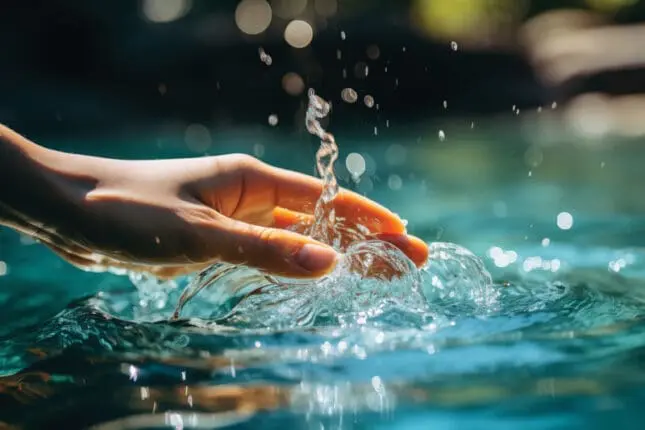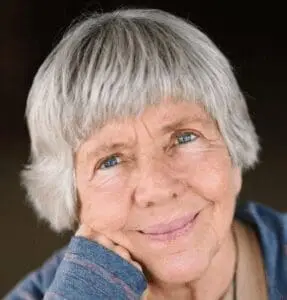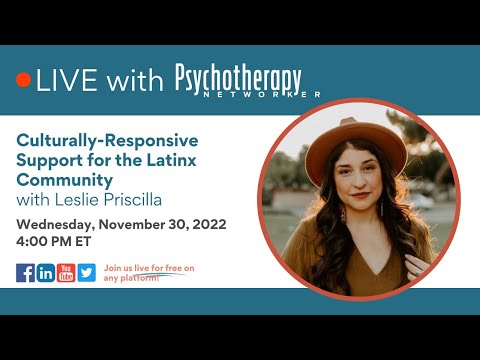In the summer of 2024, our planet endured one climate catastrophe after another. In my state of Nebraska, smoke from the fires of British Columbia kept us indoors. In Mexico, howler monkeys, dead from heat stroke, fell from the trees. Northern Italy experienced 400-year floods that are becoming ever more frequent, and in one of the earliest hurricanes on record, Houston suffered 100-mph winds that shattered windows in skyscrapers. On one day in June, the temperature in my town reached 103 degrees, with a heat index of 110. Except for swimming and watering my parched garden, I stayed inside.
When I visited my family in Canada recently, my 10-year-old grandson, Otis, said matter-of-factly, “Nonna, the world might be destroyed in my lifetime.”
I responded, “We adults are doing all we can to make sure that doesn’t happen.” Then I looked away to hide my tears. I didn’t want him to see my despair.
Joanna Macy, author of numerous books and projects on healing the environment, calls this despair “planetary anguish.” It’s the grief of losing our true mother, Mother Earth. There’s no cure for it, but I’ve found ways to alleviate its intensity through a combination of activism and self-care. Hope springs from action, which is the antidote to despair.
On an individual level, I try to make good environmental choices, despite sometimes feeling like my sacrifices are futile. I recycle plastics, even though I know the benefits are questionable. Mostly, I order vegetarian food at restaurants, and I skip the seafood section of our grocery store. But it’s frustrating. I love seafood, and I know that sacrificing a salmon dinner at a café won’t really change anything. Only international laws on corporate fishing and water pollutants will impact the health of our oceans.
Still, I keep recycling plastics and ordering tofu stir-fries. I want to be able to tell Otis that I’m doing what I can. I feel true to myself when I make choices in keeping with my values.
The Power of “We”
I feel best about my work with a group we call Guardians of the Aquifer. That effort began 14 years ago when I read Bill McKibben’s book, Eaarth. It posited that we’re already living on a new planet, and that dramatic and irreversible climate change won’t begin in our grandchildren’s lifetimes, but rather in the lifetimes of middle-aged people living today. After finishing the book, I was in a state of shock. For a few days, all I could do was mourn.
But then I talked with my friend, Brad, and an idea blossomed: we’d start a statewide environmental group. We didn’t know if we could make a difference, but we wanted to try. We agreed that we couldn’t just passively stew in our grief. So, we invited a group of like-minded people to my house for a potluck.
At that first meeting, we set some ground rules. We’d work only on Nebraska issues, and discuss only information that gave us ideas for action. “Unactionable intelligence” about problems only served to make us feel helpless. We also agreed that at the end of each meeting, members would take on specific assignments and then report on their progress at the following meeting, giving us a chance to celebrate our accomplishments.
There were countless crises to choose from. Much of our state’s water was severely polluted, our topsoil was almost gone, and our biodiversity was rapidly dwindling. But we saw one immediate and urgent problem: an international oil company, TransCanada, was planning to run a large pipeline of oil sludge from the Alberta tar sands through our fragile sandhills, over our Ogallala Aquifer, and under almost every river in the state. As audacious as it may sound, we decided to stop that KXL pipeline. As people departed that first meeting, we hugged each other. And as I did the dishes afterward, I noticed I was humming for the first time in months.
Of course, we needed allies. In our mostly red state, one that tends to be wary of activists, we knew we could only move at the speed of trust. Reaching out to farmers and ranchers would be challenging, since they tended to be conservative and dislike environmentalists. In need of a credible spokesperson, one of our members invited a well-respected Republican to take on that role. It didn’t hurt that he looked like John Wayne and wore a cowboy hat and boots. He liked to say, “There is no red water or blue water. There is only clean water or dirty water.”
We threw ourselves into the work. We held music benefits for the Coalition to Stop the Pipeline. We sponsored festivals celebrating water in as many towns as we could muster. We drove through a blizzard to testify at State Department hearings. The women in our group organized a “thank you in advance” campaign, in which we brought our governor weekly treats like homemade cookies or wildflower bouquets, each accompanied by a note thanking him in advance for opposing the pipeline. Initially, he wasn’t on board, but he eventually caved to pressure from our group and others.
As volunteers fighting an international fossil fuel corporation, we inevitably faced setbacks. But we refused to give up. After five years of hard, sustained work, something astonishing took place: we stopped the pipeline! It was the first victory of this magnitude in our country’s history.
Since then, we’ve had hard fights and only partial victories, but our morale remains strong. We keep our expectations reasonable. We give each other space to work on projects of our own choosing, without the need for consensus. Mostly we work well together, but when conflicts emerge, I’m often consulted, since my years as a therapist have taught me to be a peacemaker.
Environmental advocacy is tough going. A law in our state makes it illegal to ban plastics. And because our state’s richest corporations are industrial agricultural companies, we have almost no rules for controlling the leaching of pesticides and fertilizer into our groundwater. Many places in our state have undrinkable water.
We carry on. We lobby for clean energy. We work with legislators to reward good farming practices. Recently, we convened a well-attended conference to educate politicians and citizens about little-known, devastating health hazards of polluted water and the actions needed to stop that contamination.
We stay hopeful because we’re doing what we can. We’re a beloved community that creates power and energy by working together—and we often have fun in the process. As one of our members said, “I’d rather hang out with this group than go bowling.”
Small groups are the Miracle-Gro of social change. America lauds individual heroes, but it’s groups that get things done. The transition from “me” to “we”—the sense of being part of something larger than ourselves—is deeply healing. My faith in the power of small groups is my best reason for optimism. It allows me to feel at peace. I experience the work as therapy for me and my friends, and as a form of prayer.
Mangos and Milkweed
Meanwhile, we all want to enjoy our time on earth and love being alive. I start by protecting myself from too much news of the world. I understand our problems with loss of species diversity and the ruin of oceans and forests. I don’t need more information to understand it better. Instead, I read books I enjoy. I do a walking meditation every morning and evening, and I spend my days on work that gives me pleasure. I try to live day by day in my true home, which is the here and now.
I like to live close to my senses. I enjoy my morning coffee and the taste of a mango or fresh sweet corn. I like to feel the wind on my face and the smell of green, growing things. On summer evenings, I lie outside in my hammock and read until dark.
For me, the natural world is a great source of healing and calming. I’m a gardener and birdwatcher, and I’m lucky to live where I have access to water, open land, and big skies. My hometown of Lincoln is 20 minutes from Spring Creek Prairie, and I can lie down in its tall grasses whenever I want.
Relationships are central to my life. No one in my family lives in Lincoln, but I manage to stay close to my children, grandchildren, and Ozark cousins. We exchange frequent visits, with FaceTimes and phone calls in between. Walks and coffees with women friends sustain me. At 76, I know many people who are experiencing ill health or the loss of loved ones, and I check in with them. They do the same for me. I stay in touch with the refugee families we’ve sponsored. Their children are my walking, talking antidepressants.
My despair about our planetary future has catapulted me into a deep love of that which is left. I don’t dwell on the world’s problems as much as I focus on its many blessings. This morning, for example, the sky is blue, and the lilies, roses, milkweed, and penstemon are all in bloom. The cardinals, wrens and thrashers are singing their merry songs. When I direct my attention away from the headlines to that which is present, I’m happy. I try to live my life in gratitude for every good thing. Beauty and kindness bring me to tears almost every day.
Just yesterday, my husband and I rescued a young oriole who’d come to feast on the jelly in our feeder and gotten stuck. Slowly, we extricated him. Exhausted and terrified, he tried to escape our grasp. But when we bathed him in warm water to remove all the jelly, he suddenly stopped struggling. He knew we were helping him. We dried him off with a soft towel and set him down on the pavement. He shook himself off and flew into a pine. That made us both joyous.
In the beginning, we humans were given the greatest of all possible gifts—a verdant planet rich in everything we could possibly need and beautiful beyond belief. In the last 10,000 years, we’ve slowly, and then quickly, squandered our gift. My pain is not for myself. It’s for the children and younger adults, the birds and animals, the native plants and the rivers and oceans. I mourn the loss of the universe’s most glorious place.
Now, we stand at a precipice. Our individual and cultural resilience will be tested. Systemic changes, such as global agreements to protect our oceans, are neither big enough nor fast enough to prevent lasting damage. Nationalism and capitalism are both antithetical to the change we need to see. Yet we know that all over the world, people are organizing on behalf of the environment. And a transformation of consciousness, however remote, is possible.
We can and should work to step back from this cliff. It may make a difference, and we’ll feel better if we try. But even if we fall, let’s hold hands on our way down.
PHOTO © INNA
Mary Pipher
Mary Pipher, PhD, is a clinical psychologist, author, and climate activist. She’s a contributing writer for The New York Times and the author of 12 books, including Reviving Ophelia, Women Rowing North, and her latest, A Life in Light. Four of her books have been New York Times bestsellers. She’s received two American Psychological Association Presidential Citation awards, one of which she returned to protest psychologists’ involvement in enhanced interrogations at Guantanamo.













